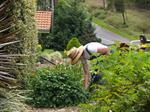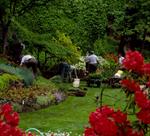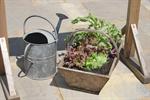
Working as a Gardener
Gardeners work in gardens maintaining the landscape undertaking jobs such as: controlling weeds, pests and diseases, pruning, mowing, fertilising, mulching, watering, cleaning sprinkler heads, using machinery, staking, raking or blowing leaf litter, making compost, removing and replacing dead plants, lifting and dividing bulbs, cultivating and aerating soil, and simple handyman jobs such as repairing garden features such as paths, fences and walls or painting. The tasks which a gardener might do can vary greatly from one garden to the next. Tasks can also be seasonal, so the work undertaken can vary from week to week.
Where Do Gardeners Work?
Some gardeners may work alone or perhaps with one other person; others can work as part of a small team, headed by a supervisor.
Small and medium size private gardens will often employ a 'contract gardener' to visit weekly or fortnightly to do the required work. This type of gardener is commonly self-employed, and can earn a very good income if they are a productive gardener and adequate business person.
Parks, commercial properties (e.g. industrial estates, shopping centres) and other large properties, may employ permanent full time gardeners. This type of gardener may not have to deal with issues associated with running a small business such us travelling from job to job, making up for time lost during wet weather, finding and managing contracts, or organising and maintaining tools and equipment. Their work may be more secure and their lives less complicated, but the wages for this type of job can be minimal unless they rise to a supervisory or management position (in which case, income rises, but so does the complexity and stresses associated with the job).
What Is Needed?
To be a really good gardener, you need:

- To be able to identify at least 500 of the most commonly cultivated plants in your locality
- An understanding of the principles of plant growth: managing soil, fertiliser, water, light
- An ability to quickly differentiate weeds from garden plants
- An ability to properly prune common garden plants
- To be able to safely and properly use garden tools and machinery
- There is also a lot of focus these days on ‘sustainability’ and the gardening industry is not exempt.
Gardeners too need to stay abreast of the latest developments in order to grow their business base or employment opportunities.
Some gardeners learn this through a course, others learn it on the job; but most often, the best gardeners learn by studying for at least a couple of years and working for at least a year alongside a highly skilled and experienced gardener. A sound course will today also include sustainable gardening methods and sound environmental approaches.
Opportunities
Knowledgeable
and skilled gardeners are often hard to find. There are plenty of people
who will prune roses, remove weeds, spray pests and mow lawns, but
there can be significant problems associated with doing any of these
things the wrong way. Many clients who employ gardeners are oblivious to
a gardener doing the wrong thing - but someone who knows how to do a
good job will gradually build credibility, attract better jobs (in every
respect) and secure a much better long term career.

CHOOSING WHERE TO STUDY
Every college offers something different.
- They all have different tutors, with varying qualifications and experiences.
- Some respond faster, some keep more detailed student records, some make your records accessible indefinitely but others do not some provide limited student support services and others unlimited.
- Some have higher course fees, but that could be because they offer more extensive support; while others may charge less but provide less services. Some may offer different payment plans to others.
- The style of teaching and learning, as well as the relative emphasis on learning compared with assessment varies
- The way work is assessed, can vary a lot from one college to the next.

The best school for one person might not necessarily be the best for the next. You need to look closely not only at what you want to study but the people and services you will be working with - and then choose something you think will work for you.
The value of the course depends upon much more than just credibility or formal credentials.
Ultimately the thing that most impacts your career is quality and quantity of what you learn and how it changes your ability to perform
MORE ADVICE
Use our FREE COURSE & CAREERS ADVISORY SERVICE (click)
More from ACS
Ebook - Advice from professional horticulturists with decades in the industry.
View eBook
Ebook - expand your knowledge; learn to identify and treat a large range of plant problems.
View eBook
Ebook - A classic that has helped many to start up and run a successful business.
View eBook
Ebook - Insightful easy to read information that expands possibilities; all you need to make a start.
View eBook
Ebook - helps you sort through the clutter and explains the many types of jobs that people who enjoy working with others may enjoy.
View eBook
Course - For professonal gardeners, those setting up a business or the home gardener.
View Course